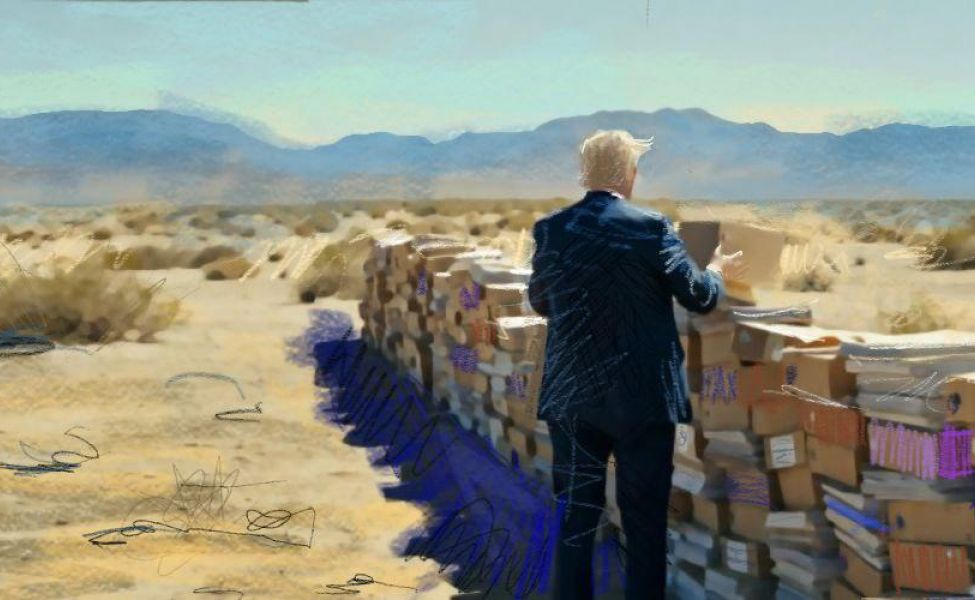
Trump’s trade policies are unlikely to have a direct impact on Kazakhstan and Central Asia
U.S. President Donald TRUMP is addressing his country’s economic challenges with aggressive trade policies, threatening tariff barriers and demanding concessions from major economies. The Times of Central Asia explores whether these actions could deepen economic challenges in Kazakhstan and the broader Central Asian region.
A New Round of Trade Wars
In early February, the United States officially announced a 25% tariff on imports from Canada and Mexico, alongside a reduced 10% tariff on Canadian energy resources. Additionally, a 10% tariff was imposed on all Chinese imports. The justification given was to curb illegal immigration and drug trafficking.
While Mexico and Canada managed to delay the new tariffs through negotiations, China responded swiftly with retaliatory measures. According to China’s Ministry of Finance, Beijing imposed a 10% tariff on U.S. oil and agricultural machinery imports, and a 15% duty on coal and liquefied natural gas (LNG). Additionally, Chinese regulators launched an antitrust investigation into Google, further escalating tensions. Despite these developments, a resolution remains possible, though seemingly ever more distant. On February 3, Trump announced plans to speak with Chinese President XI Jinping, but that call was then canceled following China’s retaliatory measures. In a further escalation, on February 5, the US Postal Service said it has stopped accepting parcels from mainland China and Hong Kong until further notice.
Meanwhile, Trump has also signaled plans to impose new duties on goods from the European Union.
As of November 2024, China was the third-largest U.S. trading partner, accounting for 11.3% of total U.S. foreign trade. Mexico (15.4%) and Canada (13.8%) ranked first and second, respectively. In contrast, Kazakhstan and other Central Asian nations do not rank among the top 15 U.S. trading partners.
Domestic Issues Outweigh External Pressures
According to economist Aidarkhan KUSAINOV, Trump’s trade policies are unlikely to have a direct impact on Kazakhstan and Central Asia. Speaking to The Times of Central Asia, Kusainov argued that domestic economic challenges far outweigh the influence of global trade wars.
“Our economy faces significant internal distortions, making global trade wars a relatively minor factor. Inflation in Kazakhstan is not caused by external pressures but by rising fuel and utility costs, tax policies, and discussions about increasing value-added tax (VAT). Within a short period, the tenge’s exchange rate against the U.S. dollar has shifted from 490 to 530,” he said.
Kusainov further emphasized that if Kazakhstan’s inflation rate were around 2%, any impact from global factors would be worth analyzing. However, with official inflation at 9% – and real inflation likely much higher – domestic issues are the primary concern.
“Our economy is so small compared to the world’s leading economies that its presence in the global market is nearly imperceptible. By economic volume, we are smaller than some Chinese provinces. Other Central Asian countries are even less integrated into global trade,” Kusainov noted.
He warned that only a large-scale global crisis could significantly impact Kazakhstan’s economy, potentially exposing internal vulnerabilities that the government can no longer mitigate.
Inflation Risks
Inflation remains a pressing concern in Kazakhstan. According to the Bureau of National Statistics, food prices rose by 1.4% in one month, while service costs increased by 1.1%, and non-food goods by 0.6%. Annual inflation reached 8.9% in January 2025, up from 8.6% in December 2024. Some essential goods, particularly utilities, saw price hikes of over 40%.
In addition, Kazakh Prime Minister Olzhas BEKTENOV recently announced the possibility of raising VAT from 12% to 20%. Experts predict that if implemented, this could drive prices up by at least 30%.
Meanwhile, analysts from Tengenomika argue that Trump’s trade wars will further strain Central Asia’s economies.
“The rise of protectionist measures among the world’s largest economies – particularly those dealing in high-tech and widely consumed goods – creates additional inflationary risks globally. This is especially concerning for small, open economies like Kazakhstan, which will ultimately bear the costs of higher import prices for essential investment and consumer goods,” the experts stated.
The Government’s Position
Kazakh officials are weighing potential outcomes. Vice Minister of Trade and Integration, Kairat TOREBAYEV, acknowledged concerns over escalating U.S.-China trade tensions.
“Yes, there are fears that the trade war could escalate, and we have considered various scenarios. One concern was an oversupply of Chinese goods due to reduced U.S. market access. However, American and Kazakh consumer preferences differ significantly, so a major influx of Chinese products into Kazakhstan is unlikely,” Torebayev explained.
He added that many Chinese manufacturers produce goods specifically for the U.S. market, where purchasing power is much higher, making redistribution to Kazakhstan a complex process.
Global Dynamics – Domestic Challenges
While Trump’s trade policies have reshaped global economic dynamics, their direct impact on Kazakhstan – and Central Asia more broadly – should remain limited. Domestic challenges including inflation, tax policies, and exchange rate fluctuations pose a far greater risk to regional economies. However, the broader inflationary pressures triggered by global protectionism could still add strain to Kazakhstan’s already fragile economic landscape.
By the The Times Of Central Asia.
Image: TCA, Aleksandr Potolitsyn.
YOU CAN SHARE YOUR OPINION AND DISCUSS THE ARTICLE ON OUR TELEGRAM CHANNEL!








